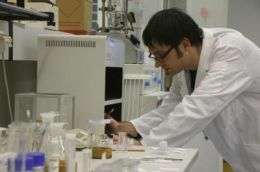A new class of anti-inflammatory drugs

In the treatment of pain, inflammation and fever, non-steroid anti-rheumatic drugs (NSAR) such as acetylsalicylic acid - more commonly known as Aspirin - or Ibuprofen have always been popular choices. However, had they been tested using today's stringent criteria, many of these drugs would not have passed the clinical trial stage, due to the potential risks and side effects they entail. This suggests the need for more innovative thinking in this area of drug therapy.
One such new approach has been developed in Manfred Schubert-Zsilavecz's laboratory at the Goethe University, using chemical substances belonging to the dual mPGES-1/5-LO-Inhibitors. Oliver Werz's group at Tübingen has characterized the substances at the molecular/pharmacological level.
Their research results now form the basis of a joint patent application, and a publication in the renowned "Journal of Medicinal Chemistry" (Koeberle et al, J Med Chem (2008), Nov 19. [Epub ahead of print]).
Aspirin and the related NSAR drugs act on the arachidonic acid biosynthesis cascade, which plays a central role in the onset of pain and inflammation. They thus prevent the synthesis of specific prostaglandins, which are essential for vital bodily functions. When the drugs are taken over a long period of time, the unselective inhibition of this essential pathway may result in unwanted side effects on the gastrointestinal tract and the cardiovascular system. As Schubert-Zsilavecz explains: "By comparison, our class of drugs/substances acts on a later stage in the arachidonate cascade, and is more selective. We therefore can expect it to have considerably fewer side effects."
A further advantage of this new class of drugs is that they not only specifically target the biosynthesis of prostaglandin, but also of leukotrienes, which are metabolites in the second important branch of the arachidonate cascade and play a central role in allergic and inflammatory reactions. This double attack promises more effective results for these new substances.
Gerd Geisslinger, Speaker of the LiFF-Initiative and President of the Center for Drug Research, Development and Safety (ZAFES) explains: "This is a most important success for our newly established Lipid Signalling Research Centre, which was established only a short time ago under the LOEWE initiative, funding research in the German state Hesse."
Source: Goethe University Frankfurt




















